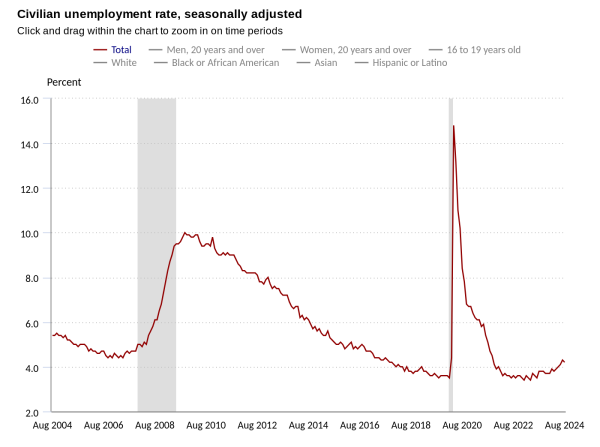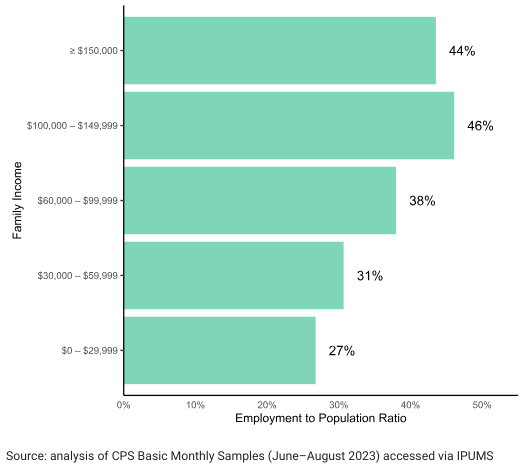“Nobody wants to work anymore” is something you hear a lot as a teenager searching for a job. It seems no matter how many resumes you submit, or how many applications you fill out, it’s impossible to get a response, let alone an interview. Sometimes they don’t even bother to message you back to let you know you didn’t make the cut. It leaves you thinking:
“How much harder do I have to want to work?”
Yet, every store you visit is terribly understaffed. Lines are slow, and advertisements are visible everywhere: “We are hiring! Starting $20 an hour.” “Urgently hiring!” “Come in and apply.”
According to the Bureau of Labor Statistics, employment rates are back to their pre-pandemic levels. As of July 2024, it was at 4.3%. Although higher than the February 2020 3.5%, it’s near nothing compared to 14.8% during April of that same year.

What happened? Is it you that can’t seem to be good enough for your local McDonalds? Even if you have relevant experience? Does experience even matter anymore? According to your parents, all you have to do is walk in dressed nicely and ask for one.
Well, one thing is for sure: it’s not just you.
Since the COVID-19 pandemic and the massive layoffs that came with it, high school aged workers have been disproportionately affected because of their over representation in customer facing roles. The UCLA Labor Center observes that 21% of young workers work in restaurants or bars, and another 20% in retail trade. Less than a quarter of people aged 16 to 19 in California were employed over the summer last year, the lowest in the country, according to the Department of Labor. Even that is much higher than it usually is, as employment rates spike every summer when students have more free time and flexible schedules.
Research done by brookings.edu shows that in 2021 and the following years, big corporations raked in billions of extra dollars in profits. This was due to a combination of raising prices and cutting production costs, including labor. Over the first 22 months of the pandemic, they made billions of dollars in profit as their stock prices skyrocketed, and their employee numbers dropped. Corporations have realized that while being understaffed, they still function, and it is so much cheaper to keep it that way. Fast food restaurants are still able to pump out lunch orders despite there only being two employees in the store, and it forces people to work harder for less total pay.
The short story is: it’s not your fault. You are still valuable as a worker and as a person.
Finding a workplace that wants you (and one that you will be fairly compensated in) is incredibly difficult. Many teenagers work under the table for a family or friends’ business, but for those without connections or parents who own a business, it can be much harder. Studies done by the Department of Labor show that this particularly affects those who are low income, and may need a job to help afford bills or household needs. It’s the hard truth, but the easiest way to secure a stable job as someone young, even if you don’t lack experience, is connections; and for the people that need it most it can be the hardest thing to get.
In the words of the DOL, “The likelihood of a young person being employed during the summer months is strongly associated with their family’s income. A young person from a family with a higher income is more likely to be employed during the summer months than a young person from a family earning less. For example, nearly half (46%) of youth from families earning between $100,000 and $149,999 per year were employed, whereas about only a quarter of young people (27%) from families earning less than $30,000 had summer employment.”

Unfortunately, there is no secret formula to getting hired and paid well, and if there is, I sure haven’t found it.
────────────────────────────────────────────────────────
Advice from the Author:
One thing I can say is to look into local businesses in your area, the more niche the better. These businesses, whether it be a mom-and-pop donut shop or a local pizza place, have a harder time finding help to hire due to having such a small audience. They are more likely to be flexible with a schedule, and will probably actually read any resume you drop off. In my experience, the best job I have worked so far has been web design for a local non profit.
These types of places are definitely the type to hire based on connections rather than the classic ads in the paper, but these connections might be easier to form since they likely get less business and spread by word of mouth. Try picking up a coffee and a donut at a local shop, and next time you do, ask if they are hiring any help. Even if the answer is no, it’s always good to support your small local businesses.